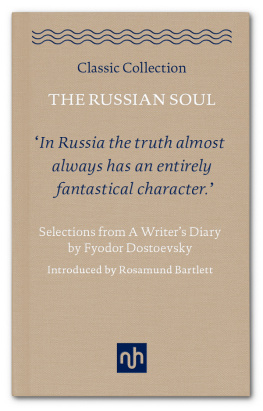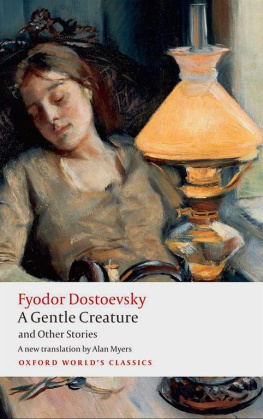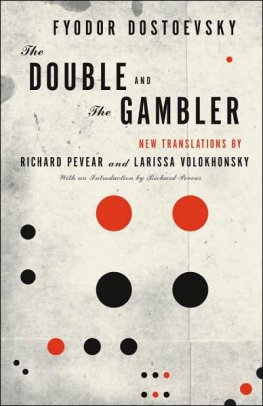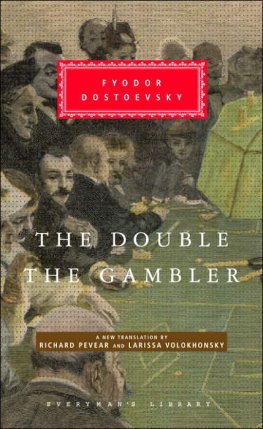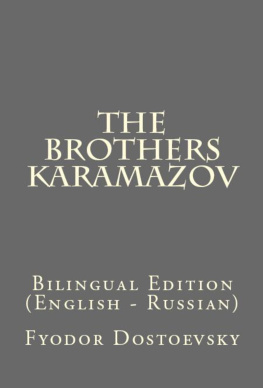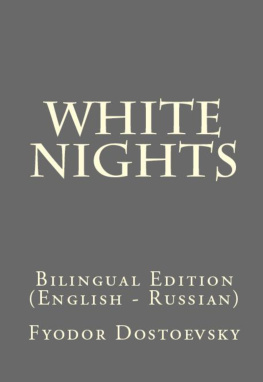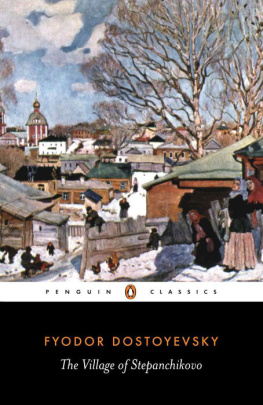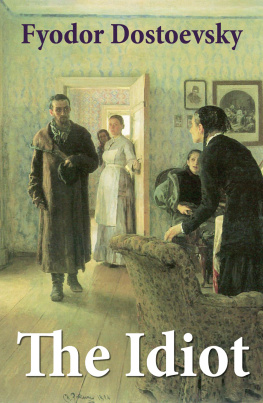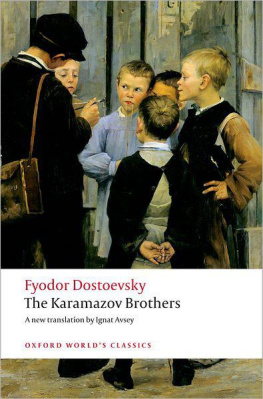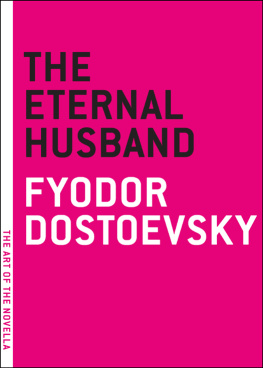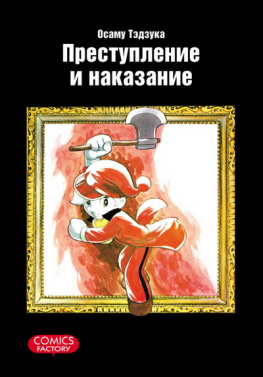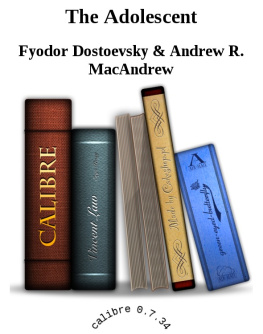Dostoevsky Fyodor - The Russian soul: selections from A writers diary
Here you can read online Dostoevsky Fyodor - The Russian soul: selections from A writers diary full text of the book (entire story) in english for free. Download pdf and epub, get meaning, cover and reviews about this ebook. year: 2017, publisher: Notting Hill Editions, genre: Detective and thriller. Description of the work, (preface) as well as reviews are available. Best literature library LitArk.com created for fans of good reading and offers a wide selection of genres:
Romance novel
Science fiction
Adventure
Detective
Science
History
Home and family
Prose
Art
Politics
Computer
Non-fiction
Religion
Business
Children
Humor
Choose a favorite category and find really read worthwhile books. Enjoy immersion in the world of imagination, feel the emotions of the characters or learn something new for yourself, make an fascinating discovery.
- Book:The Russian soul: selections from A writers diary
- Author:
- Publisher:Notting Hill Editions
- Genre:
- Year:2017
- Rating:4 / 5
- Favourites:Add to favourites
- Your mark:
- 80
- 1
- 2
- 3
- 4
- 5
The Russian soul: selections from A writers diary: summary, description and annotation
We offer to read an annotation, description, summary or preface (depends on what the author of the book "The Russian soul: selections from A writers diary" wrote himself). If you haven't found the necessary information about the book — write in the comments, we will try to find it.
The Russian soul: selections from A writers diary — read online for free the complete book (whole text) full work
Below is the text of the book, divided by pages. System saving the place of the last page read, allows you to conveniently read the book "The Russian soul: selections from A writers diary" online for free, without having to search again every time where you left off. Put a bookmark, and you can go to the page where you finished reading at any time.
Font size:
Interval:
Bookmark:

Fyodor Dostoevsky (18211881) was born in Moscow, the son of a physician, and educated at the Military Engineering College in St Petersburg. His first novel, Poor Folk (1846), was well received. In 1849 he was arrested and sentenced to death for his involvement with a group of Utopian Socialists, the Petrashevsky Circle, only to be reprieved at the last moment. His experience of four years of hard labour and imprisonment in Siberia led to a profound change in his ideology. This is reflected in all his subsequent fictional masterpieces, from Notes from the House of the Dead (1862), to Crime and Punishment (1866) and The Brothers Karamazov (1880), as well as his journalism, including A Writers Diary, completed during his last decade.
Rosamund Bartlett is a writer, scholar and translator. The author of biographies of Tolstoy and Chekhov, she has also published books on Wagner, Shostakovich and the Futurist opera Victory Over The Sun. Her new translation of Anna Karenina was published in 2014, and follows two anthologies of Chekhov stories and a volume of his letters. She has written on Russian literature, art and music for the Financial Times, the Wall Street Journal, Apollo, and the Royal Opera House, and worked with institutions such as the National Theatre, the Salzburg Festival and the Art Gallery of New South Wales in Sydney.

Fyodor Mikhailovich Dostoevsky
Selections from A Writers Diary
introduced by
Rosamund Bartlett

... what truly matters here is that the Russian instinct has not died: the Russian soul, albeit unconsciously, has protested precisely in the name of its Russianness, in the name of its downtrodden and Russian principle.
Fyodor Dostoevsky, My Paradox, June 1876
Rosamund Bartlett
V irulent nationalism, religious extremism, ethnic intolerance, urban deprivation, child abuse, suicide, opinionated criticism, intimate confession, utopian dreaming, genial digression, moral fervour, profound insight, macabre humour and superlative fiction welcome to the world of Dostoevskys A Writers Diary. A voluminous and variegated miscellany in which the celebrated author spoke to his readers about issues concerning Russia, mostly directly, but sometimes indirectly via short stories, it is a work as eerily prescient of global preoccupations in the twenty-first century as it is frequently overlooked. Dostoevskys Writers Diary was also his creative laboratory. And as a work in which he was ultimately concerned with defining the elusive Russian soul, which he believed was most perfectly embodied by his forebear Pushkin, it is a source of fundamental importance in understanding the complex mind behind his artistic works.
A unique journalistic enterprise incorporating art and politics, and both non-fiction and fiction, in which Dostoevsky came to perform the roles of sole writer, editor and publisher, A Writers Diary is his most original work. And he was adamant that his Diary be regarded as a single oeuvre, on a par with his novels, despite the somewhat piecemeal nature of its publication in monthly installments over the course of what proved to be the last decade of his life. A Writers Diary was also Dostoevskys favourite work, but it has perennially remained in the shadow of his novels, in both its Russian and anglophone versions, despite the publication in 1994 of a comprehensive and authoritative English edition, from which all but one of the extracts anthologised here are drawn. One of the main reasons for the Diarys relative obscurity is its sheer size: with a total number of pages equivalent to two of his novels put together, it is Dostoevskys longest literary work. Also slightly daunting is the oddity of its hybrid contents, whose genre which could be portrayed as a quixotic, probing, perhaps quintessentially Russian take on the essay Dostoevsky purposefully made hard to categorise. Dostoevskys position as a reactionary and ideologically problematic figure after the Revolution did not help. Despite the enormous popularity of A Writers Diary during Dostoevskys lifetime, it was only ever re-published once during the Soviet period, in 1929, just before Stalins Cultural Revolution began placing strictures on the arts. Remarkably, it was not until 2011 that the first properly annotated complete edition was published in Russia (densely printed on fifteen hundred pages).
In the West, scholarship on A Writers Diary was hampered for decades by an understandable reluctance to confront head-on the chauvinist and anti-semitic sentiments Dostoevsky expressed on its pages. By drawing a distinction between his artistic and political writings which their author never had, and mostly passing in silence over the latter, Western scholars were not able to investigate A Writers Diary as a whole. That situation ended once and for all with the publication of the final volume of Joseph Franks magisterial biography in 2002, and the flurry of books and articles which one can now consult about A Writers Diary, by both Western and Russian scholars, suggests an eagerness to make up for lost time, and a re-assessment of the works position in Dostoevskys legacy. This anthology from A Writers Diary brings together a representative selection of entries chosen to reflect the diverse nature of its contents. In them Dostoevsky demonstrates his great power as a writer, as well as his unerring ability to impart a deeper moral and religious resonance to the social and political concerns he raises.
When Dostoevsky began work on his Writers Diary in 1873, he was fifty two years old, happily married, and an esteemed and established novelist. Such security had come at considerable personal cost, however, as we know from the traumatic facts of his earlier biography. The second son of an impecunious Moscow army doctor whose dutiful state service had brought him into the lower echelons of the noble class, the young Fyodor Dostoevsky set his heart on becoming a writer while studying at the Military Engineering College in St Petersburg. He launched his literary career in 1843, the year of his graduation, with a translation of Balzacs then recent novel Eugnie Grandet. But it was not until two years later, having resigned his engineering lieutenants commission, that he made his own debut. Shepherded by the influential progressive critic Vissarion Belinsky, the publication of Poor Folk brought him instantly into the front ranks of Russian writers. Dostoevskys refusal to continue with that works humanitarian theme in The Double, published in 1846, coupled with an inability to moderate his highly strung temperament, led to his equally swift fall from grace. But social ostracism within the small confines of St Petersburgs stiflingly small literary community was nothing compared to the Siberian exile which followed his arrest in April 1849 by the Secret Police.
Prodigiously well-read in the literature and thought of Romanticism, with a deep moral opposition to serfdom, Dostoevsky had naturally been drawn into the orbit of the Petrashevsky Circle, and the Charles Fourier-inspired discussions of French Utopian Socialism its members conducted behind closed doors. When these discussions became more heated as the 1848 Revolutions broke out across Europe, the paranoid Nicholas I took extreme action, determined to stamp out subversive activity in Russia at any cost. After enduring eight months of imprisonment in the notorious dungeon of the Peter and Paul Fortress, Dostoevsky found himself being led to the stake and enduring a mock execution by firing squad before learning that his sentence was being commuted to hard labour in Siberia.
Next pageFont size:
Interval:
Bookmark:
Similar books «The Russian soul: selections from A writers diary»
Look at similar books to The Russian soul: selections from A writers diary. We have selected literature similar in name and meaning in the hope of providing readers with more options to find new, interesting, not yet read works.
Discussion, reviews of the book The Russian soul: selections from A writers diary and just readers' own opinions. Leave your comments, write what you think about the work, its meaning or the main characters. Specify what exactly you liked and what you didn't like, and why you think so.

